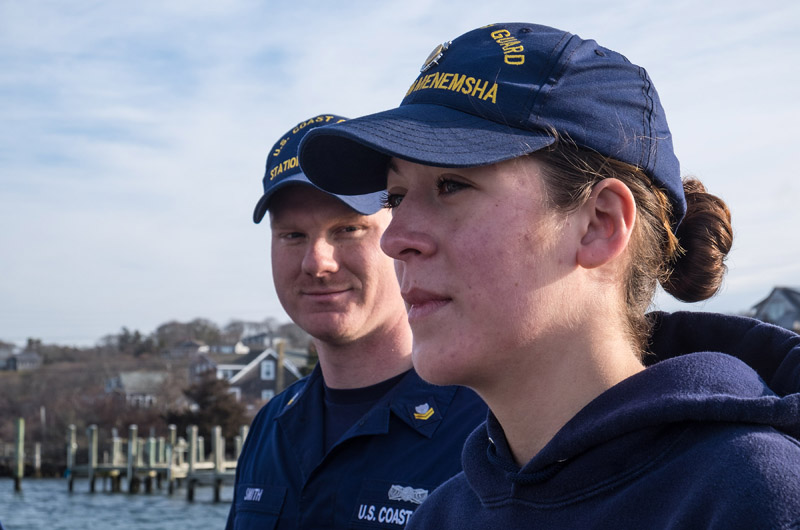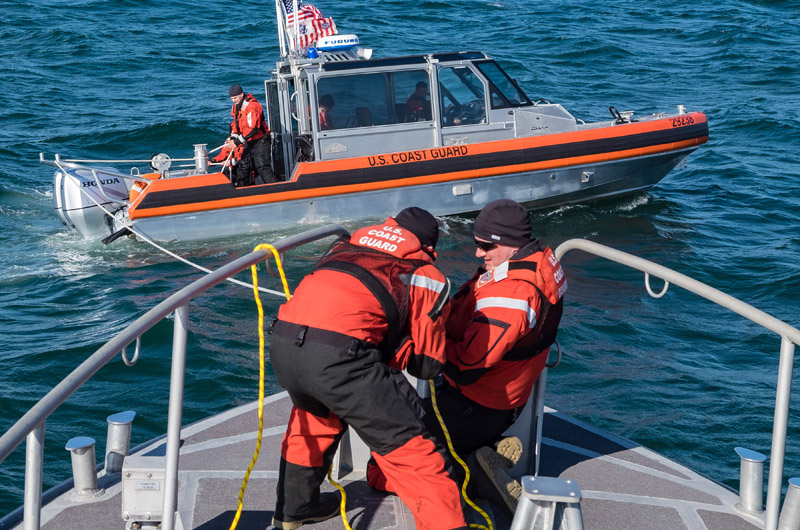Every morning, members of Coast Guard Station Menemsha head down to the West Dock, past the old fishing shacks on Basin Road, to begin their day’s work.
On a balmy morning this week, after the usual boat check, a few members gathered on the deck of the station’s 47-foot motor lifeboat, enjoying the morning sun on the harbor. A few fishing boats lined the commercial bulkhead across the way, but hardly anyone was in sight.
No one wore jackets or gloves, opting instead for their standard duty uniforms — navy blue button-down shirts and pants with black boots. The mild weather was a welcome reprieve in a profession where adequate clothing can be a matter of life and death in the winter.
“It feels a little like springtime,” said Adam Smith, who grew up in Pennsylvania and joined the station about two years ago. Mason Martin, one of several members from southern states, agreed: “This is like deep winter in Texas,” he said.
The station’s 23 members hail from all over the country, and most had little prior experience with the sea. Some still struggle with the relative isolation of Island winters, but welcome their time off every two or three days.
“It’s not that bad in the summertime, but the wintertime is where it gets you,” Mr. Smith said. Movies, working out at the Y and drinks at the Ritz in Oak Bluffs are among the most popular winter pastimes for off-duty crew members, along with occasional video games at the station and playing with Coco, a 10-month-old chocolate Labrador retriever and station mascot.
Things tend to quiet down at the station in winter, with work shifting away from recreational mishaps near shore to the year-round commercial fishing fleet and station maintenance. But crew members are always on their toes.
Life in the Coast Guard revolves largely around training and moving up the ranks, which continues year-round, regardless of the weather. Learning is highly collaborative, with crews taking on apprentices and learning from each other as well as attending schools elsewhere in the country.
“Even when you go out for normal ops you learn something,” said Mr. Smith, cradling his morning coffee on the harbor.
Savannah Hooe, the station’s newest member, from Virginia, hopes to eventually join the crew of the 29-foot response boat, which was docked just in from the 47-footer. The first steps are learning to stand watch and to perform tasks on the bigger boat. “You get a feel for it, what you are doing on the boat,” she said. “Now it’s really just getting underway on the 29 and practicing and training.”
Qualifying for boat crew requires a board exam and a physical test where apprentices prove their abilities. Some may opt to become firemen (engineers) instead, which would involve similar ranks, and close collaboration with the other members.
A large Coast Guard airplane painted white and orange flew low over the harbor as the crew members stood on the deck. In cases where a call is made far offshore, they said, a plane or helicopter from Otis Air National Guard Base may go out first to drop supplies or pinpoint a location. Station Menemsha may then send assistance by water.
The station’s area of responsibility extends west to New Bedford and the Rhode Island state line, and 50 miles south of Noman’s Land. Oak Bluffs, Tisbury and Edgartown are handled by station Woods Hole.
In the summer, boats often run aground in the narrow passes between the Elizabeth Islands, and in Menemsha, where a few gulls were gathered on a shallow outcropping in the channel. “Low tide, we’ve seen so many people run up on that thing,” said Shaquille Reed, a long-serving station member.
But in winter, the focus often shifts to larger commercial boats around Noman’s Land and Gay Head to the west. Boaters often find themselves taking on water in heavy seas or when they forget to plug their boats. “All of a sudden they are in ankle-deep water,” Mr. Smith said.
One case last fall involved a large fishing boat near Westport that ran aground before dawn and was being battered by heavy seas. “They had every casualty that you plan for,” Mr. Smith said. “They had taken on water, they had a small engine fire, then their generators went down. It was at nighttime, so they just went completely black, lost communication.”
A small crew from Menemsha teamed up with the tugboat Jaguar out of New Bedford to dewater the boat and see it to safety.
A more recent case involved a fishing boat in the early morning, this time with its rudder locked to starboard so it could only go in circles.
“Most of our big things are early in the morning,” Mr. Reed said, noting the critical hours of 11 p.m. to around 6 a.m. “But in the summertime it’s all day long.”
Crew members are entitled to eight hours of rest per day, so in principle when they get called out in critical hours, they can make up the lost sleep. “It’s written in there but it doesn’t always work out,” Mr. Martin said.
Back at the station, members of the outgoing section awaited the formal announcement that would relieve them for the week. To pass the time they played with Coco, who is undergoing some training of her own. So far her skills include sit, shake and lie down.
“Those are the only three tricks we taught her,” Mr. Reed said, coaxing her to lie down with a treat.
Coco goes everywhere, even sometimes on the boats, and helps boost morale among the crew, which chips in for food and supplies. Her home base is the communication center, where members broadcast announcements and respond to calls.
Now and then a voice crackled over the radio behind a large turquoise console. One transmission announced a naval ship passing through security zones along a canal. One voice commanded: “Stop or you will be fired upon!” but that was only a drill.
With the official announcement around 10 a.m. the outgoing section was relieved and its replacement took over. As the week began, chef Mark Seawell and assistant Ben Renna prepared a menu of hamburgers, fries and apple pie in the galley.
Among the first orders of business for the incoming section was a drill involving both the 47 and 29-foot boats (one of the larger boats was out for repairs). As required in temperatures below 60 degrees, the crews geared up in orange and black dry suits and were soon underway in heavy seas.
Three quarters of a mile out from the jetties, rocking heavily in the waves, Chief Petty Officer Trey Huneycutt cut the engine on the 47-footer, picked up the radio and gave the call: “We are dead in the water.”
A few moments later the smaller boat made its approach and Josh Hughes and Gabriel Villano took their positions on deck with red bags that contained yellow lines attached to a heavy towline. Senior Chief Robert Riemer and Petty Officer Spencer Thigpen stood ready on the bow of the 47-footer to catch the line and tie it to a post.
The first few attempts were thwarted by heavy wind, and each time the apprentice rapidly hauled the line back in and tucked it into the bag. Far to the west, the Gay Head Light flashed its red and white signal over the sound.
Eventually the bag sailed onto the bow of the larger boat as Mr. Villano and then Mr. Hughes completed the task in just a few tries.
Mr. Huneycutt yelled over the wind: “Usually it takes one, but these guys are all new,” he said. “We don’t necessarily hold them to the standard of one shot. They have to at least be able to hit the target.”
The drill continued in the harbor, with the smaller boat tying up alongside the 47-footer, a maneuver used to escort disabled boats to the dock. The constant shouting of both crews now combined to form a tightly knit ensemble.
“Villano, get onboard their boat!” shouted Petty Officer Ryan Rossi.
“Aye!” shouted Mr. Villano, stepping over and further securing the boats.
A lone seagull hunkered down in a parking spot just a few feet away, unconcerned by the commotion.
Both drills went smoothly and spirits were high all around as the boats returned to the dock. Mr. Huneycutt cut the engine and stillness returned to the harbor.
Leaning against the railing of the 47-footer, Mr. Riemer reflected on the diversity of the station crew and his first year and a half as senior chief. “The heavy weather capability that we have here is about as much as I’ve seen,” he said, noting the two larger boats and the ability for advanced training throughout the year.
He too noted some recent calls that showcased the station’s abilities, including one during the blizzard last month that involved a 10-hour trip to escort a fishing boat in distress. The crew returned unharmed to a foot of snow in Menemsha.
“Having the right people certified to do the job is critical,” Mr. Riemer said. “We’re real fortunate here to have the crew mix that we do.”
The two morning crews gathered their things and headed back to the boathouse.
“It was a good day,” Mr. Riemer said.











Comments (1)
Comments
Comment policy »